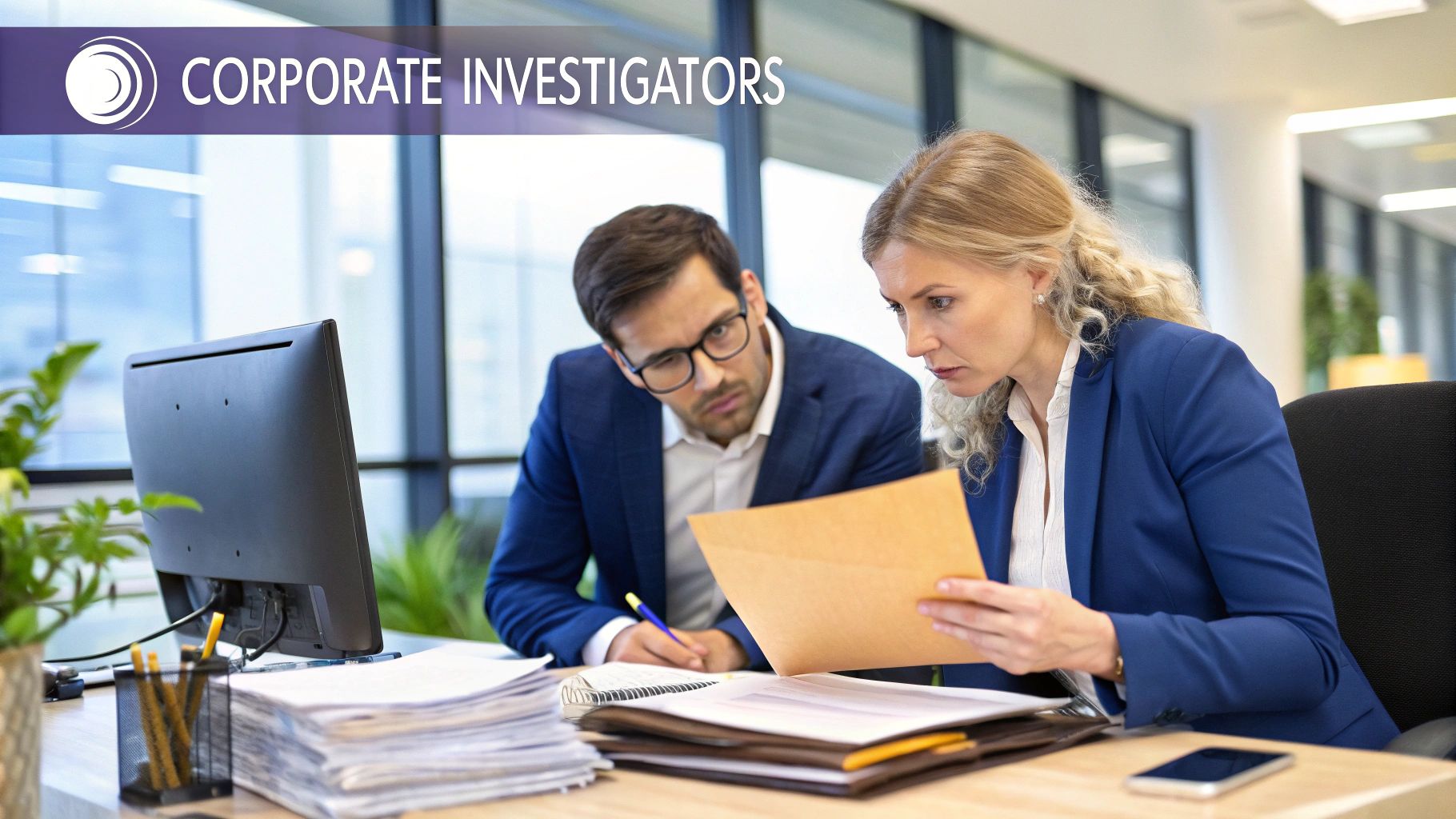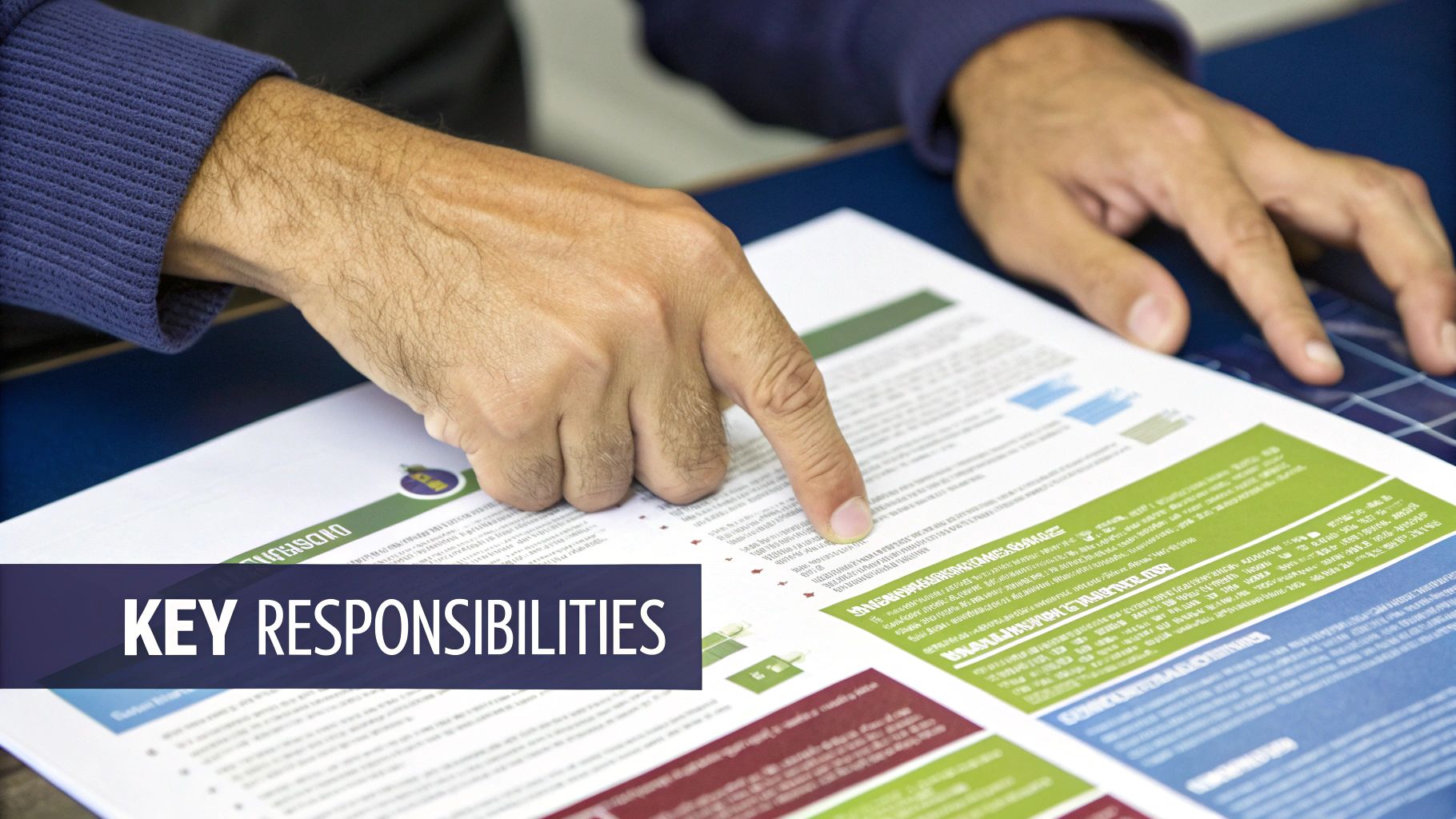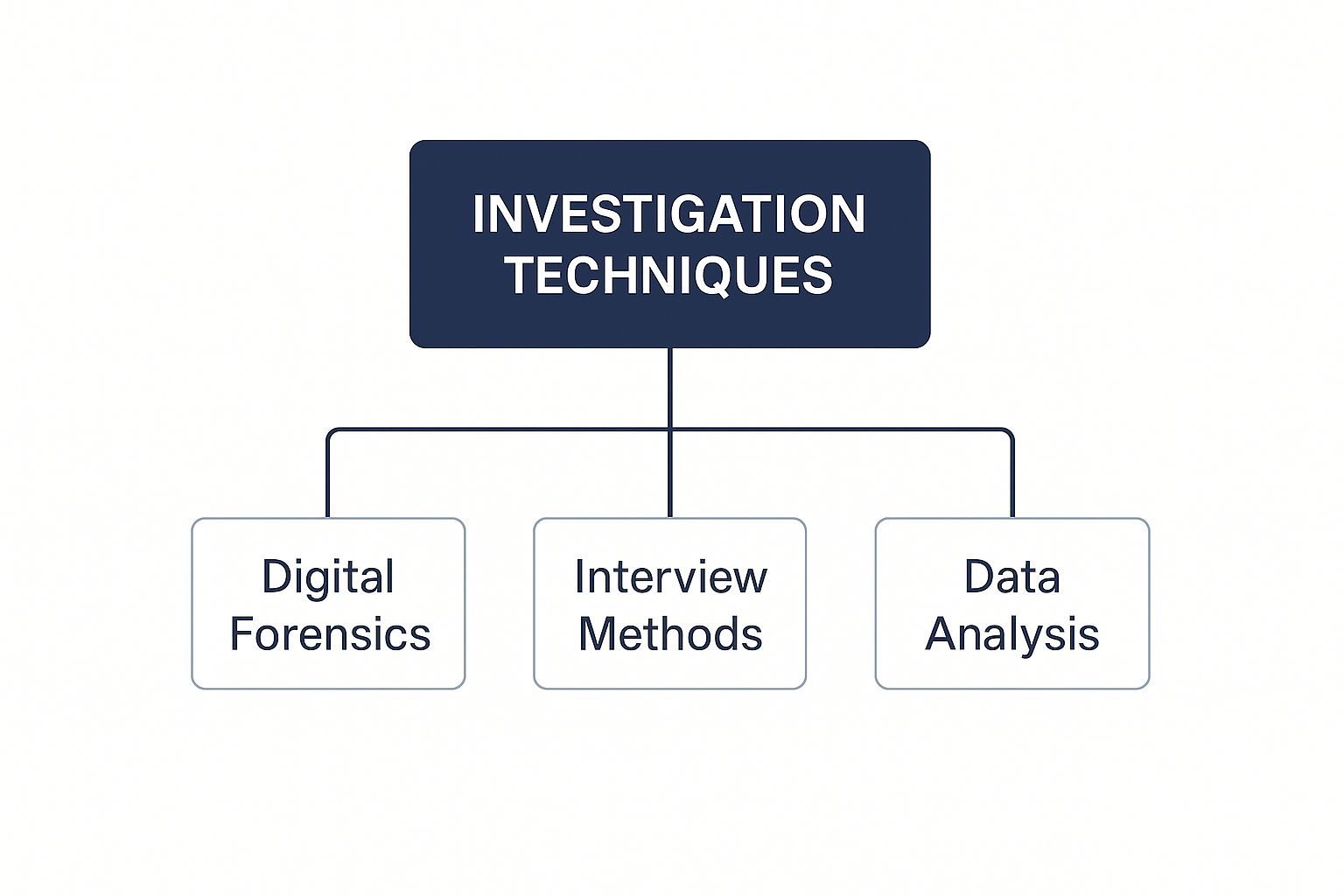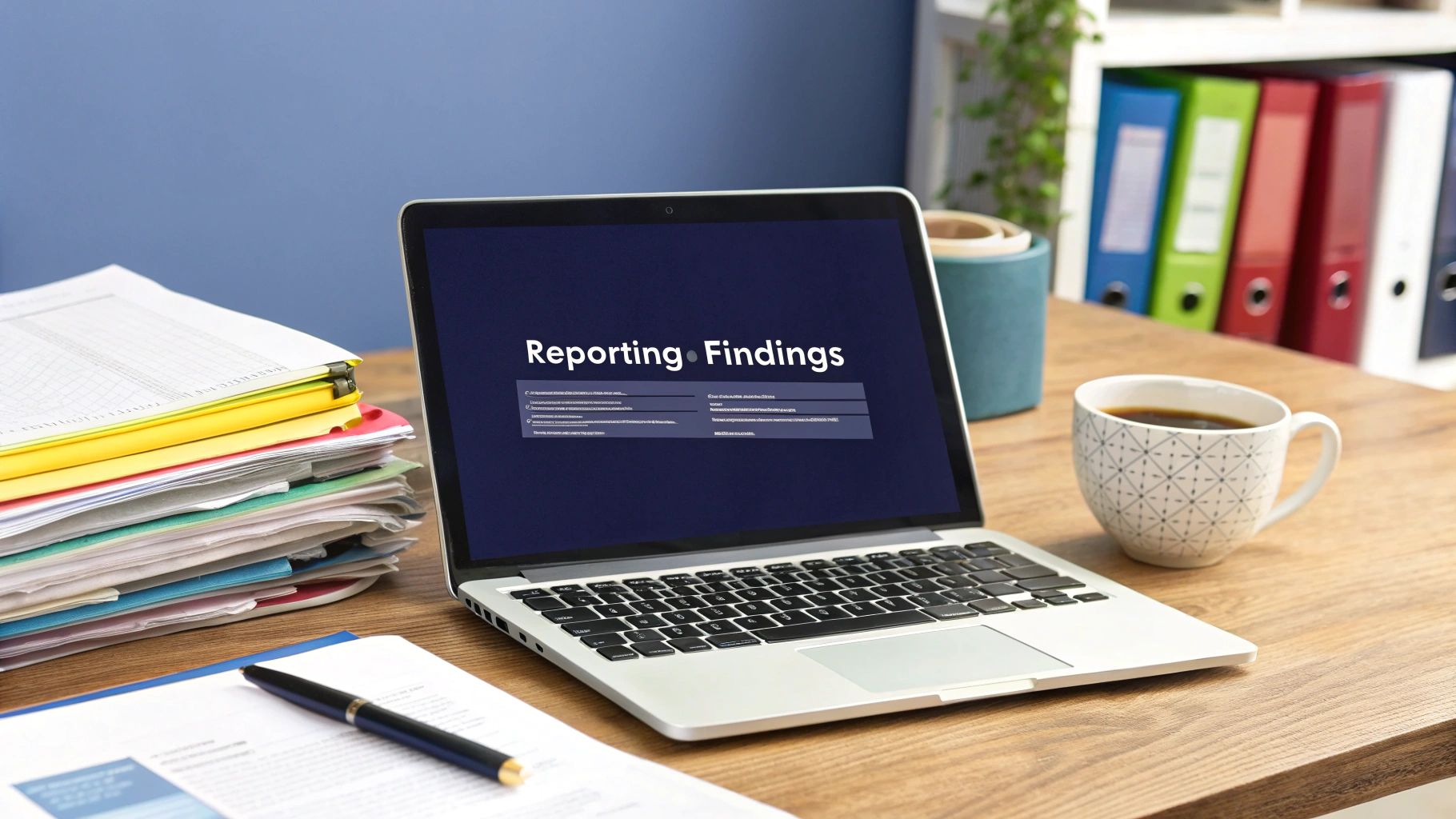Corporate Investigators: Your Business Security Playbook
- Showix technical Team
- Jun 18, 2025
- 15 min read
Updated: Jul 28, 2025
Meet Your Business's Hidden Guardians

Imagine finding small, persistent discrepancies in your company’s financial reports. While they might look like simple clerical errors, you have a nagging feeling that something is wrong. This is the moment when corporate investigators become your most important asset. Forget the trench-coated figures of old movies; think instead of sharp, discreet problem-solvers who protect businesses from threats that could otherwise go unnoticed.
These experts operate behind the scenes, blending traditional detective work with modern data analysis to uncover the truth. They are the professionals you call when you suspect misconduct, face potential fraud, or have serious doubts about a new business partnership.
More Than Just Movie Detectives
What truly defines a professional corporate investigator is a deep understanding of the business world. They know the specific weak points companies have, whether it’s a small family business or a large corporation. They act as an essential early warning system, spotting risks that could otherwise remain hidden until the damage is done. Their work is built on discretion and a respect for the complexities of corporate law, finance, and human behaviour.
The stakes are high. Ignoring potential wrongdoing can lead to serious trouble, as government bodies like the UK's Serious Fraud Office (SFO) are dedicated to tackling major economic crime.
The SFO's focus on complex fraud highlights the severe outcomes businesses can face. This makes proactive internal investigation a key part of managing risk. The primary goal of a corporate investigator is to resolve issues internally before they ever reach the attention of outside regulators.
A Modern Necessity for UK Businesses
The role of a corporate investigator is distinct, even though it shares core skills with other types of inquiry. While the principles of gathering and analysing evidence are universal, the corporate arena demands a specialised skillset focused on commercial and legal rules. The challenges are unique, covering everything from internal theft and intellectual property disputes to vetting potential business mergers. You can learn more in our article about expert detective services you can trust to see how the fields compare. This specialisation ensures an investigation is not just successful but also fully compliant with UK corporate and employment law.
Throughout this guide, we’ll explore the specific techniques these guardians use, the red flags that signal a need for their help, and how they are adapting to shield UK businesses from new and elaborate threats. Understanding their role is the first step toward building a stronger, more secure organisation.
How Corporate Investigation Evolved Into Modern Business Defence

From Paper Trails to Digital Footprints
Think of a corporate investigator as a specialised tracker. In the past, they followed paper trails and physical clues to uncover wrongdoing. Today, the trail they follow is almost entirely digital. A modern investigator needs to be just as skilled at tracing cryptocurrency transactions as they are at conducting a traditional interview.
The widespread adoption of remote work, cloud storage, and online business operations has opened up new avenues for misconduct. At the same time, it has given investigators powerful new methods for detection and prevention. Today’s professional blends old-school investigative instincts with a mastery of current technology.
Key areas of modern expertise include:
Digital Forensics: Recovering and analysing evidence from computers, servers, and mobile devices.
Blockchain Analysis: Following the movement of funds through complex cryptocurrency ledgers.
Open-Source Intelligence (OSINT): Gathering vital information from public sources like social media profiles and online records.
Advanced Data Analytics: Sifting through enormous company datasets to find suspicious patterns that are invisible to the naked eye.
Navigating a New Compliance and Market Landscape
This new world of digital evidence means investigators must be experts in more than just technology. They also have to navigate a maze of complex privacy laws and data protection rules. Decades ago, these legal frameworks were minimal. Now, making sure an investigation follows standards like the UK GDPR is critical to its success.
This added complexity is visible in the industry's growth. The UK's investigation services market, covering both private and corporate cases, had a market size of about £191.5 million in 2025. By the close of 2024, there were 1,302 businesses in this sector. While the industry experienced a small compound annual growth rate decline of -0.1% from 2019 to 2024, forecasts predict a return to growth, pointing to a rising need for these skills. You can explore more detailed market analysis on UK investigation services. This shows how corporate investigators are adapting to a more demanding role.
Despite all the changes in technology and law, the core mission of a thorough, ethical, and objective investigation has not changed. The results of any inquiry must be solid enough to hold up in court while giving business leaders clear information to act on.
This evolution has shaped the modern corporate investigator into a unique hybrid professional: part detective, part data scientist, and part compliance specialist. Their ability to work where these fields intersect has made them more important than ever, helping businesses protect themselves from threats where old security methods are no longer enough.
Essential Services That Protect Your Business
Think of a professional corporate investigator as a specialist with a toolkit of services, each designed to shield your business from different kinds of threats. These aren't generic solutions; they are precise methods applied to specific problems. Just as a doctor uses different tools to diagnose different ailments, an investigator selects the right service to turn suspicion into fact and confusion into clarity.
Each service targets a unique corporate vulnerability, offering a clear path forward when your business faces uncertainty.
To help you understand the options available, here’s a breakdown of common corporate investigation services. This table outlines what each service typically involves, its complexity, and when you might need to call in the experts.
Corporate Investigation Services Breakdown
Understanding different investigation services, their typical scope, complexity, and when your business might need them
Service Type | Typical Timeline | Complexity Level | Best Used For | Expected Outcomes |
|---|---|---|---|---|
Fraud Investigation | 2-8 weeks | High | Uncovering embezzlement, financial statement fraud, or corruption. | Concrete evidence for legal action, recovery of funds, and internal discipline. |
Due Diligence | 1-6 weeks | Medium to High | Vetting potential mergers, acquisitions, partners, or key hires. | A clear picture of a target's financial health, reputation, and hidden liabilities. |
Employee Background Checks | 3-10 days | Low to Medium | Screening new hires, especially for sensitive or executive roles. | Verification of credentials and identification of potential risks or conflicts of interest. |
Workplace Misconduct | 1-4 weeks | Medium | Addressing allegations of harassment, discrimination, or policy violations. | An impartial, fact-based report to support fair disciplinary action and mitigate legal risk. |
IP & Trade Secret Theft | Varies | High | Investigating theft of proprietary formulas, client lists, or data. | Identification of responsible parties and evidence to stop the leak and pursue damages. |
Digital Forensics | Varies | High | Recovering and analyzing data from computers, servers, and phones. | Court-admissible digital evidence, a clear timeline of events, and attribution of actions. |
Asset Tracing | 2-8+ weeks | High | Locating hidden funds or property in fraud cases or legal disputes. | Recovery of stolen assets and enforcement of legal judgments. |
As you can see, the right service depends entirely on the problem you're facing. Choosing the correct one is the first step toward a successful resolution.
Financial and Due Diligence Investigations
At the heart of many business disputes is money. A fraud investigation is essential for detecting financial wrongdoing, whether it's an employee subtly cooking the books to hide losses or a more direct case of embezzlement. Investigators act like financial detectives, meticulously tracing the flow of money to gather the hard evidence needed for internal action or legal proceedings.
Think of due diligence investigations as a necessary safety check before making a major commitment. Whether you're planning a merger, bringing on a new business partner, or relying on a critical supplier, this service verifies that everything is as it seems. A thorough check can uncover hidden debts, pending lawsuits, or reputational skeletons that could otherwise lead to a disastrous business decision.
People-Focused Investigations
Your team is your biggest strength, but internal issues can also pose a significant risk. Employee background investigations are much more than a quick call to a past employer. These inquiries are designed to confirm a candidate's qualifications, search for undisclosed conflicts of interest, and identify any red flags that might compromise your company’s security or culture. As you can learn more in our article about the importance of conducting thorough background checks, this is a fundamental part of managing corporate risk.
When sensitive allegations arise internally, workplace misconduct investigations provide a path to a fair and objective resolution. An impartial investigator can handle claims of harassment, discrimination, or ethical violations with the discretion they require. This fact-finding approach ensures all parties are treated fairly and protects the company from significant legal exposure and reputational harm.
This infographic illustrates how investigators combine different methods to achieve their goals.

Digital, Asset, and Compliance Investigations
In a connected world, safeguarding what makes your business special is a top priority. Intellectual property (IP) protection is a vital service for companies whose value lies in trade secrets, proprietary data, or unique designs. Investigators help find and stop the theft of your valuable IP, whether it's an insider planning to launch a rival company or an external competitor.
When the crucial evidence exists on a server, laptop, or smartphone, digital forensics provides the key. These specialists recover and analyse electronic data, carefully preserving a chain of custody so that any findings are admissible in a legal setting. This is the modern equivalent of dusting for fingerprints.
Digital forensics often goes hand-in-hand with asset tracing, a service used to locate hidden or moved funds and property. This is particularly useful in complex fraud cases where a wrongdoer has tried to obscure the trail of stolen money across different accounts or even countries.
Finally, compliance investigations act as a checkup to ensure your business is following all relevant industry regulations and internal policies. Staying compliant helps you avoid steep fines and the negative publicity that comes with regulatory trouble, creating a strong, multi-layered defense for your organisation.
Recognising When You Need Professional Help
Knowing which investigative service you might need is one part of the puzzle. Recognising the exact moment to call for help is another skill entirely. Many business leaders learn the hard way that waiting for absolute proof of wrongdoing means they’ve already waited too long.
Early warning signs are rarely loud alarms. They're more often quiet inconsistencies, strange patterns, or just a nagging feeling that something isn't right. Hiring professional corporate investigators is about trusting that instinct and acting before a small issue grows into a crisis that could destabilise your entire business.
From Subtle Signs to Clear Threats
Think about a long-serving employee whose lifestyle suddenly seems to outpace their salary, raising quiet questions about their activities. Or consider a situation where confidential plans repeatedly find their way to a competitor, suggesting an internal leak. These scenarios require a delicate and methodical touch that only a professional investigator can bring.
Trying to handle it yourself can backfire spectacularly. You might alert the person responsible, accidentally destroy critical evidence, or create legal headaches related to UK employment law. A professional gathers the facts quietly and objectively, ensuring the findings are impartial and legally sound without disrupting your day-to-day operations.
Situations Demanding Immediate Action
While some signs are subtle, others are impossible to ignore. These are the red flags that require an immediate response to prevent serious harm to your company's finances, reputation, and stability.
It's time to seek expert help when you encounter high-stakes problems like these:
Regulatory Compliance Alarms: You're facing a potential breach of UK law that could lead to heavy fines or even a shutdown of your operations.
Anonymous Whistleblower Tips: You receive a credible, anonymous tip about potential fraud, corruption, or other significant misconduct.
Suspicious Financial Activity: You discover unexplained transactions or financial irregularities that hint at a deeper, more systemic problem.
Digital Security Breaches: When your data integrity is at risk, protecting your digital assets is crucial. To safeguard your business, learn how to implement effective cloud security solutions.
The field of corporate investigations is broad, addressing a wide range of business risks beyond simple fraud.
This overview shows that investigations are also vital for protecting intellectual property, performing due diligence, and maintaining a secure corporate environment. The decision to hire an investigator comes down to a simple risk assessment: weigh the manageable cost of a professional inquiry against the potentially massive losses from a threat left unchecked.
Many businesses find that proactive investigations cost significantly less than reactive damage control. The peace of mind that comes from knowing your operations are secure is often worth the investment, even if an investigation finds nothing wrong. Investigators can also help you build systems to prevent future issues, making them partners in long-term protection, not just emergency responders.
Real Cases That Show Investigators In Action
Theory is one thing, but seeing investigators on the ground is another. The real value of these professionals comes into focus when you look at the actual challenges UK businesses face. These scenarios show how what looks like a minor issue on the surface can be the tip of a much larger iceberg.
When Surface Problems Hide Deeper Issues
Imagine a manufacturing company noticing that its inventory numbers just aren't adding up across several warehouses. On the surface, it looked like simple carelessness or a few administrative mistakes. But the problem persisted, so professional corporate investigators were called in to dig deeper.
Instead of just recounting stock, they developed a broader plan. Their work included discreet surveillance to watch for suspicious employee and vehicle activity, a deep forensic dive into shipping records to find irregularities, and a series of carefully managed interviews with staff. This patient work eventually exposed a large-scale theft ring where employees were working with outside logistics partners. The business was left with clear evidence to act on and stop the bleeding.
Securing High-Stakes Business Decisions
Merger and acquisition (M&A) deals are another area where investigators play a critical role. Before a company commits millions of pounds to an acquisition, it needs to be absolutely sure about what it's buying. This is where investigators perform thorough due diligence, verifying every claim about the target company's financial stability, legal standing, and operational health.
This process often uncovers crucial details that were conveniently left out of the sales pitch, such as hidden debts or pending lawsuits. Finding these issues can completely change the deal's value or even give the buyer solid grounds to walk away, saving the company from a financial catastrophe. The complexity of these cases shouldn't be underestimated. For instance, the UK's Serious Fraud Office (SFO) had 130 live cases as of 2024, and the average investigation takes 4.4 years to complete. This timeline highlights just how tangled corporate fraud can be, making private due diligence a vital first line of defence. You can learn more about the UK's corporate crime risk landscape here.
Protecting Your Most Valuable Assets
In the technology sector, a company's intellectual property (IP) can be its most precious asset. A common fear is a departing employee taking trade secrets to a competitor or starting their own rival company. When this is suspected, the investigation becomes highly technical.
Investigators use digital forensics to trace data access and communication, essentially creating a digital breadcrumb trail to show who accessed what and when. This is often paired with traditional, discreet inquiries to build a full picture. In a completely different but equally sensitive field, allegations of workplace harassment require a very careful touch. Investigators must navigate these situations with extreme care, ensuring all parties are protected while they gather impartial facts. Their goal isn't to take sides but to build a factual foundation for the company to make a fair decision.
Each of these examples shows how adaptable a skilled investigator must be. Whether a case needs digital forensics, a financial audit, or sensitive interviewing skills, they adjust their tools to the situation. In the end, it is their commitment to objectivity and professionalism that makes their findings not just helpful but credible enough to back up major business decisions or to be used in court.
Finding The Right Investigator For Your Situation

Core Credentials and Specialisation
Your first step should be to check for professional credentials. Look for investigators who are members of respected UK professional bodies, as this signals a commitment to ethical conduct and continuous learning. These credentials are a baseline for quality and accountability.
However, experience within your specific industry is just as vital. An investigator with a background in financial services will already be familiar with its regulations and common fraud patterns. Likewise, one who has worked in logistics will be better equipped to investigate supply chain theft. When you vet a potential partner, ask them directly about their experience with cases like yours.
Sector-Specific Knowledge: Do they understand the language, rules, and typical problems in your industry?
Case Experience: Have they managed investigations of a similar size and complexity before?
Legal Familiarity: Are they knowledgeable about the relevant UK employment, corporate, and privacy laws?
This specialised knowledge means they can get to work immediately without a learning curve, spotting details that a generalist might overlook.
Technical Capabilities and Communication
Today’s investigations often revolve around digital evidence. The best corporate investigators use modern tools for digital forensics, data analysis, and legally sound evidence collection. Their skill in ethically recovering information from laptops, phones, and cloud storage is frequently what breaks a case open.
Just as important is their communication style. A good investigator can distill complex information into clear, actionable advice. Talk about their reporting process from the start. Do you need detailed written reports for your legal team, or are regular verbal briefings better for making quick business decisions? The right investigator will match your company's communication preferences, keeping you informed every step of the way.
To help you organise your search, here is a guide to the key factors you should evaluate when making your selection.
Evaluation Factor | Why It's Critical | What To Look For | Warning Signs |
|---|---|---|---|
Professional Licensing & Credentials | This ensures they operate legally and adhere to a code of ethics. It is your first line of defence against unprofessional conduct. | Membership in recognized UK professional bodies. A valid license and full insurance coverage. | No verifiable credentials. Unwillingness to provide proof of insurance or licensing. |
Industry-Specific Experience | An investigator who knows your sector understands its unique risks and regulations, leading to a faster, more effective inquiry. | A portfolio of successful cases in your industry (e.g., finance, manufacturing). They should "speak your language." | Vague answers about past cases or experience that is completely unrelated to your needs. |
Technical & Digital Forensics Skills | A huge amount of corporate evidence is digital. The ability to legally retrieve data from devices is often what solves a case. | Use of current digital forensic tools. Clear knowledge of evidence preservation protocols (chain of custody). | Outdated methods or a focus only on physical surveillance without acknowledging digital needs. |
Communication & Reporting Style | The findings are useless if you cannot understand them. The reporting must match your company's needs for decision-making. | Clear, concise sample reports. Willingness to adapt communication frequency and format (e.g., daily emails vs. weekly calls). | Poor communication during the initial consultation. Reports filled with jargon or lacking clear conclusions. |
Verifiable References & Reputation | Past performance is a strong indicator of future results. References confirm reliability and professionalism under pressure. | Willingness to provide references from past corporate clients. A solid professional reputation online and in the industry. | Hesitation to provide references. Testimonials that seem vague or cannot be verified. |
Ultimately, these criteria help you build a complete picture of an investigator's capabilities and determine if they are the right fit for your sensitive matter.
Practical Considerations: Scope, Cost, and Trust
If your business operates in multiple locations across the UK or even internationally, an investigator's geographic reach is an important detail. An agency with a network of professionals can coordinate a widespread investigation much more effectively than hiring separate teams for each site.
Cost structures also differ. Some investigators charge by the hour, while others might offer a fixed price for defined services like a background check or due diligence report. Understanding the fee structure is essential for budgeting and preventing surprise costs. Looking at real-world examples, such as these Case Studies - Magier, can help illustrate how costs relate to the work involved and the final outcome.
Finally, always request references from previous corporate clients. Hearing about their experience gives you direct insight into an investigator's dependability and effectiveness. The initial consultation is your opportunity to gauge these qualities firsthand. Your decision will come down to trust and confidentiality, as you will be sharing sensitive information. Choosing a trustworthy partner is a critical first step, and for more in-depth guidance, you can check out our guide on how to hire an expert private investigator in the UK.
Making Corporate Investigations Work For Your Business
Using corporate investigation services effectively means going beyond just reacting to problems. It involves a strategic approach that weaves these services into your core business goals and risk management, much like having a fire escape plan before you ever smell smoke.
Building a Framework for Action
The first step is to establish clear internal policies. These rules should outline exactly when a corporate investigation is necessary and who has the authority to start one. This clarity prevents hesitation during a crisis and ensures decisions are made fairly and consistently across the company. A well-defined policy is the backbone of your procedure when the pressure is on.
With a policy in place, you can plan ahead. Think about budgeting for investigation services as a standard part of your risk management. Many business leaders discover that the cost of a proactive investigation is far less than the financial and reputational damage that comes from cleaning up a full-blown crisis after the fact.
It's also wise to build a relationship with a trusted corporate investigator before an issue arises. A crisis rarely leaves you the time needed to properly vet and choose a professional. Having a reliable partner on standby means you can act quickly and with confidence when you need to.
Preparing Your People and Processes
Your framework is only as effective as the people who use it. Train key staff, like managers and HR personnel, to spot the subtle warning signs that might require professional assistance. This training should emphasize the need for discretion and following proper escalation channels to protect both the investigation's integrity and your business relationships.
This readiness also applies to your paperwork. Make sure your document retention policies are set up to aid potential investigations. Key records, from financial statements to email conversations, must be preserved correctly and be readily available to investigators. This transforms your administrative systems into a crucial asset during an inquiry.
Thinking Beyond the Investigation
A successful investigation ends with a report, but your strategy should look much further. Consider the legal consequences of potential findings ahead of time. Create plans for different outcomes, which could involve employee discipline, starting civil litigation to recover losses, or meeting mandatory reporting requirements in the UK.
You also need a communication plan. Decide how the results will be shared internally with leadership and, if needed, externally with stakeholders. This planning helps maintain confidentiality and legal privilege while safeguarding your company’s reputation.
Ultimately, the goal isn't just to find wrongdoing. It's about making your business stronger. A corporate investigation should pinpoint and fix systemic weaknesses, improving your internal controls for lasting strength and success.
When your business needs clear answers and a stronger defence, professional support is essential. Contact Sentry Private Investigators Ltd today to learn how our expert services can protect your organisation.




